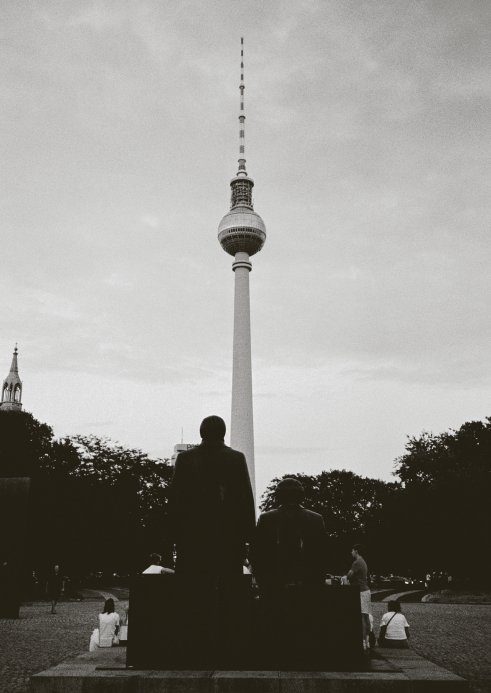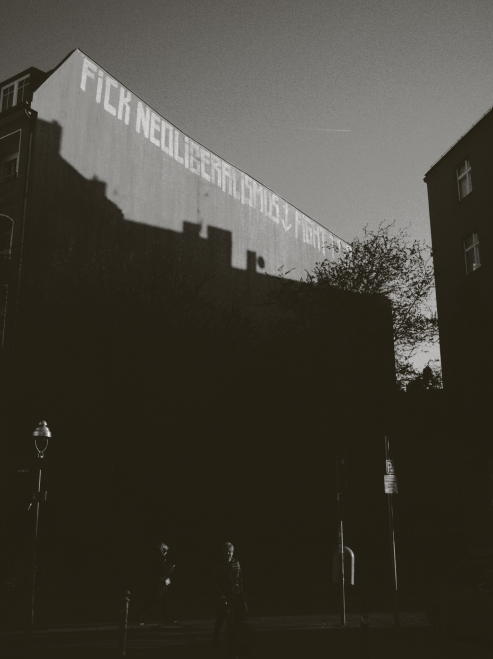One solution – revolution! A-, Anti- Anti- capitalista – Overthrow the System, revolution anarchista! The revolution is my girlfriend! And all the rest of it. At demonstrations, on t-shirts, in lyrics: the magic word „revolution“ has a big importance in left images and language. But when we actually start some form of activism – at university, at school, in groups or autonomous centres – our activities can often seem far away from fundamental political change. Much rather we go to anti-Nazi rallies, meet in reading groups, criticize dominant male talking at the student council, or block nuclear waste transports. Sometimes, when we read a text or write a call for a demo this „revolution“ pops up, but it always seems to be an empty phrase, somewhat detached from our daily lives. In the following, the magic word will lose its magic and the empty phrase will be filled with some content. So why do we want something like that – a basic change of society, a break with existing conditions? And in which cases are smaller changes – reforms – enough?
Reforms are not enough
We don’t want a revolution because it is cool. Of course, we can enjoy all of these things: posters with masked guys (sometimes and more and more: women, too) hurling rocks, pictures of the Zapatista uprising in Mexico or historical accounts of the Kronstadt rebellion in 1921. We are actually quite glad that all we have for supposed „normal“ things like patriotism, racism, sexism, homophobia or capitalism is an outstretched middle finger. And that what we want is something totally, totally different. But in fact, it’s not about aesthetics, being cool, a big „fuck you“ gesture or about being dogmatically grounded in abstract revolutionary principles. We want a revolution because some conditions simply can’t be changed step by step. Instead, some kind of turning point is needed – hopefully sooner than later – where a large proportion of people says: „Nyet. This capitalist mode of production, what a silly thing! It’s time to fundamentally restructure society.“
An example may illustrate how we come to this conclusion: Every day about 30,000 people die as a consequence of malnutrition. For a long time there have been attempts to ease the situation – emergency aid, genetic engineering to improve crop yields, boosting the local economy by help of microfinancing, and always new UN targets to reduce world hunger. They all fail, it’s devastating. When, at the same time, there is food overproduction in Europe, the suggestion seems reasonable to bring these goods to poorer regions. Oftentimes, this suggestion is struck down as naive because it would destroy local economies. This point illustrates the very insanity of the capitalist mode of production, where it makes more sense to destroy food surplus than to help starving people with it – because by helping them even more people would starve in the long run! Instead, everyone is supposed to be enabled to participate in the competition of the market economy. The only problem is: Where there is a competition there will inevitably be losers. As long as money is needed to buy food, large quantities of losers will starve. We don’t have any idea how to modify this perfidious logic via reforms (if you know better, please send us an email!). Until then, to make hunger history we don’t see any other possibility than a revolution in the current mode of production.
But it’s not even necessary to look at faraway regions. Even in everyday life, one runs up against the limits of capitalism: When someone is hungry but doesn’t have any money and therefore steals cheese in a supermarket, they get into trouble: annoyed cashier, aggressive security personnel, abusive policemen, police station, getting charged. The behavior of „not taking part in their game“ certainly didn’t abolish any form of authority and nobody is better off afterwards (apart from maybe a sadistic cop). The same goes for the idea of moving to the countryside with some friends to grow carrots to live on. If people enjoy this they certainly should do it. However it’s no skin off capitalism’s nose. In short: Capitalism is a tough nut to crack. It’s no use to just scratch the surface. For production to not be focused on producing profit anymore – with the abovementioned consequences – it needs to be fundamentally altered.
We imagine this revolution as a kind of „collective self-liberation,“ as a joint process that takes our personal needs and desires as a starting point while focusing on fundamental change. Before that, however, we need to become aware of what actually constitutes these needs and desires. Because not every revolution is necessarily emancipatory. Moreover, left symbolism often lets one think that a revolution is a matter of half a day. Some highly symbolic building gets stormed, the red and black flag hoisted and – hey! – we have a new society! When we talk about a „rupture“, however, we actually envision quite a long process. Who knows, maybe there will be such a symbolic day with stormed, burning buildings. But more importantly, there will be discussions before and after about how to create a new society.
More than a revolution
At the same time there are some differences when we talk about other forms of hierarchy than capitalism: if we aim for a society that doesn’t produce for profit but for our needs that doesn’t mean that sexism will automatically be obliterated. Chances are high that again it would be men talking in the councils (or however we would organize ourselves). Maybe someone would insult their lesbian neighbor. And we have to assume that many people would continue to be racist. In the long run, different economic conditions could change this: in a world without nations, without an absurd division of labor, the idea of splitting people up into good „natives“ and bad „strangers“ wouldn’t make sense. And if the economy had no structural need for high and low-paying jobs, people would no longer have to foster the illusion that women have some kind of special talent for domestic work, raising children, being a secretary or taking care of the elderly.
But returning to the original topic: What we want is „the good life“. And it would be cynical to say, as some do: „Sure, it will change after the revolution“. Because even in the here and now there are some strategies for changing ways of thinking and behaving that make life a little more worthwhile and certainly more emancipatory. This change in the „here and now“ makes less sense concerning capitalism than it does concerning some other power relations: Concerning capitalism, the first step is to understand how it actually works, what attempts at abolition there already have been and why they mostly failed, so that we know how to do it better next time. The means to achieve this knowledge are reading and learning, discussing and organizing, in reading groups, workshops, seminars, groups. Ever closer to the day when the majority of people says: „Nyet!“
Much more concrete possible courses of action are available when it comes to racism for example. If in the supermarket I see some „white“ grandpa harassing a „black“ person in the queue in a racist way, it makes sense to intervene. In order to show Nazi grandpa limits, in order to support the person who experiences racism and in order to make clear in public that racism isn’t accepted. It may not make a difference in grandpa’s head, but some things will become less acceptable. Or when a shop assistant asks a woman looking at drills if she is searching for a nice birthday present for their boyfriend, it may make sense for someone to point out that it’s her passion to drill – while at the same time thinking how silly it is to state such nonsense only to unhinge his old-fashioned perception of women a bit.
Or when an unknown woman dares to ask, hunkered in a coochie-coochie-coo-style over a buggy: „Is it a boy or a girl?“ One might answer: „I don’t know. That’s its decision, but it’s not able to talk yet“. Thus challenging her odd belief only two genders exist. In theory, it’s well imaginable that categories such as „man“, „woman“, „transgender“, „gay“, „asexual“ and so on may become unimportant to people. In order to make the absurdity of these categorizations clear no „revolution“ is necessarily needed. Changes in meaning can happen step by step. It makes sense to start with yourself, to question the clichés in one’s own roles and head.
Expand the floor of the cage, but remember it’s still a cage
In short: We don’t think it’s wise to hold everything off until „after the revolution“, just like Christians hold off on their Kingdom of Heaven.
„Reform“ is often used as a swearword. „Reformist“ sounds uncool and seems boring. However, we don’t really mind, because again, it’s not about being cool or uncool, but rather the best strategies for changing society. And we approve of everything that makes people happier, that focuses on people’s needs and repels authority. If these are strategies that work in the here and now, that’s perfect.
One example of this could be non-hierarchical decision-making. The editors of „Routes sucrées“ are a collective for good reason, consisting of different age groups and experiences. Perhaps our work would be more „efficient“ with one boss who makes decisions and arranges duties. But we want to live in a world where the opinions and needs of every single person count, where no one has to feel small and insignificant, gets bossed around or has less to say. And it makes sense to get better at dealing with each other in a non-hierarchical way, with all the difficulties that come with it – because of course even in formally non-hierarchical groups there are hierarchies that must be examined.
Another example could be leftist „free spaces“ such as alternative housing projects or squats. Certainly, they are only partially „free“ – the existence of squatted buildings is dependent on official decisions. And often, much energy is used up talking about the tedious details of living together. It’s hard to say how this would look like in a free society where you wouldn’t have to worry about utility bills and rent. The converse argument –“It doesn’t work in my shared flat, how could it ever work in a free society?“- is invalid, because it ignores the lack of money and time as reasons why „it doesn’t work“. In any case, in a liberated society there will – finally – be a need to decide all things collectively. It makes sense to „practice“, because political struggles are always a communal process. And even in the time of Facebook and cell phones, all the reading groups, events and political meetings need concrete physical places. For this, left „free spaces“ like squats, housing co-ops, and autonomous centers form essential infrastructure.
Lost in the revolutionary supermarket
Reforms, meaning small steps towards a better world, always involve dangers: It’s easy to get caught up in the small changes and forget that the aim actually was something „completely different“. Most people might want this in the long run, but often lose sight of this initial aim in their daily work to ameliorate refugee rights or other injustices via political parties or NGOs.
That’s why in the middle of all these non-hierarchical experiences we don’t want to forget the fact that the reason for all the harm isn’t only the bad behavior of individuals, but that this society structurally encourages people to behave like crap. And that the current mode of production systematically produces harm. And that many basic changes won’t happen without a complete overthrow of existing society. Therefore: To the books and onto the barricades!
For further reading
Audio on „Reform, Revolution and Resistance“ by the „Platypus Affiliated Society“
Seven Left Myths About Capitalism
– Murray Bookchin: „Anarchism, Marxism and the Future of the Left“, Ak Press, 352 p.


